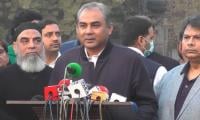Side-effect
The writer is a poet and author
based in Islamabad.
I wouldn’t want to be seen as a scoundrel taking last refuge in patriotism, to quote Samuel Johnson. In fact, my belief is in the definition assigned to patriotism by Julian Barnes in one of his works of fiction.
Barnes says that the greatest patriotism is to tell your country when it is behaving dishonourably or foolishly. Hence, I wouldn’t be seen as the most patriotic anyway by some of my country women and men because I am among those who would continue to tell both the powers that be and society at large that we are wrong in so many places in the way we think and the way we act, be it in the areas of our economy, foreign policy, principles of governance or narrative of the state.
Having said that, I cannot deny that there is a strong natural impulse to support my fellow country women and men when they play a sport internationally or compete in some discipline of culture and art. Even if it is a Twenty-20 form of cricket which I consider an insult to the finest form of the game – Test cricket – and nothing more than an expedient commercial enterprise. (And if this makes one sound like a geriatric cynic so be it.)
Therefore, it makes me feel good, really good, when someone from Pakistan is recognised for her or his achievements in any branch of knowledge, field of art or type of sport. Perhaps the doom and gloom that surrounds us for decades now has made us crave for some good news, some positive development, some respite from the horrid circumstances we face as a country and as a people and some acknowledgement of our being in the comity of nations.
In this intellectual wilderness our elites have managed to create and the sea of mediocrity within which our institutions float, we can only crave and clamour for feats of excellence achieved by some Pakistani person or team or institution. We even own those wholeheartedly and call them Pakistani who were born here or even if only their parents were born here but they left Pakistan and made some other place their abode. An association with the land and people of our country makes it enough for us to consider them our own.
For those of us who have struggled for the status of women and the realisation of their fundamental human rights and for an equal and dignified life of those belonging to minority faiths, it is even more delightful when some woman or minority citizen excels. In this background, we received some good news over the past couple of weeks.
First and foremost, in terms of its significance for humanity at large and the body of our collective knowledge is the work of Prof Dr Nergis Mavalvala from the Massachusetts Institute of Technology (MIT). She is both a woman and also someone belonging to a Zoroastrian family from Pakistan. No doubt she must be an American citizen and but still she is widely introduced as a Pakistan-American astrophysicist. Born and raised in Karachi, she finished her higher education in the US. The key role she played in a high-end scientific research that led to the observation of gravitational waves brought her name to the fore.
Confirming a major prediction from Albert Einstein made one hundred years ago in his General Theory of Relativity, Mavalvala is a part of the team that has opened a new window of inquiry into the universe. She has been teaching at the prestigious MIT for the last fourteen years and has conducted research in other universities and research institutions.
Mavalvala lives closer to the East Coast in the US. Around the West Coast of the US, another woman from Pakistan who was also born in Karachi – ten years after Prof Mavalvala – received her second Oscar award at the 88th Academy Awards held in Hollywood.
Sharmeen Obaid-Chinoy is a filmmaker whose documentary ‘Saving Face’ brought her an Oscar in 2012. The film was about women who are acid burn victims. Where the film highlighted the inhuman practice of throwing acid on women which sometimes kills them but mostly scars their faces and parts of the body forever, it also showcased the amazing work done by a British-Pakistani plastic surgeon and his team to somehow heal and to an extent recreate the faces of these women.
Obaid-Chinoy won her second Oscar the other day for her film on the brutal practice of honour killing. The film ‘A Girl in the River: The Price of Forgiveness’ is the story of a survivor of an attack in the name of honour. It is no small feat. She and her team deserve to be congratulated and celebrated. Both times when her films won Oscars in the category of short documentary films, Obaid-Chinoy was showered with praise on the one hand and bitterly criticised on the other.
There are some in Pakistan who think that highlighting our social ills and campaigning for the rights of women or vulnerable sections of society is in fact part of a sinister design to malign Pakistan and blemish its image – as if there is a positive image and as if there are huge amounts of respect that we enjoy among other nations.
On the contrary, when we raise these issues in our works of art, we also confirm that our artists, writers, filmmakers and performers are not only conscious of the problems we face but are also determined to resolve them. Such creative attempts also bring forth the resilience of our people in the face of all odds and their resolve to change the circumstances. All healthy societies accept and recognise their problems rather than shoving them under the carpet.
Once we accept, we strive to change. If we continue to deny, the problems will not only persist but exponentially grow. For instance, the United States still confronts the inherent issue of racism, even after electing a black president twice. It is not kept hidden. From making fascinating films on racism and slavery to the critique of the Academy Awards for not nominating an African-American artiste for two years in a row, everything is said and discussed publicly. Also, the film this year that received the Oscar for best picture is about the journalistic investigation of systemic child sexual abuse committed by Roman Catholic priests in the US.
In other socially advanced societies as well, issues are confronted not circumvented like we wish to do in Pakistan. Needless to say, there is nowhere in the world where human societies are not faced by problems. What makes us a little unique is our collective state of denial in many cases.
But when we celebrate our successes, albeit small, or lament our failures in our struggle that falls within the politics of identity – identity of women as women or identity based on a faith other than the majority faith – those championing the mainstream rights narrative tend to completely forget the politics of class.
Pakistan is an increasingly unequal society. Our workers and peasants are blatantly denied their economic and social rights. More than a third of Pakistanis continue to live below the poverty line. Another third fluctuate up and down the indicators of poverty and dispossession.
In the same year Sharmeen Obaid-Chinoy won her first Oscar, there was a major industrial fire in her city. It simply remained a news item. No country-wide campaign by the civil society or media was ever launched. No film has yet been made on the incident. Perhaps it will never be made.
Those 258 garment workers who were burnt to death in the factory fire in Baldia Town, Karachi, were as precious as our women who face violence and our children who were killed in their school. The politics of identity and the politics of class are intertwined. Successes under one cannot be sustained unless we aim for justice and equality across social classes in Pakistan.
Email: harris.khalique@gmail.com
There are over 11 million Pakistanis settled abroad, out of which around six million work in Gulf and Middle East
This year alone, US Treasury would have to roll-over $10 to $14 trillion in maturing short-term debt
Tear gas no longer marks just protest sites; it paints entire cities as battlegrounds but then again, PTI did it first
Political structures and governance systems have been central to economic and social development
It is confirmed now 40 Pakistanis had died after boat of migrants had capsized in sea near Greece
Many people believe that in future, AI will play an even more significant role in their lives







